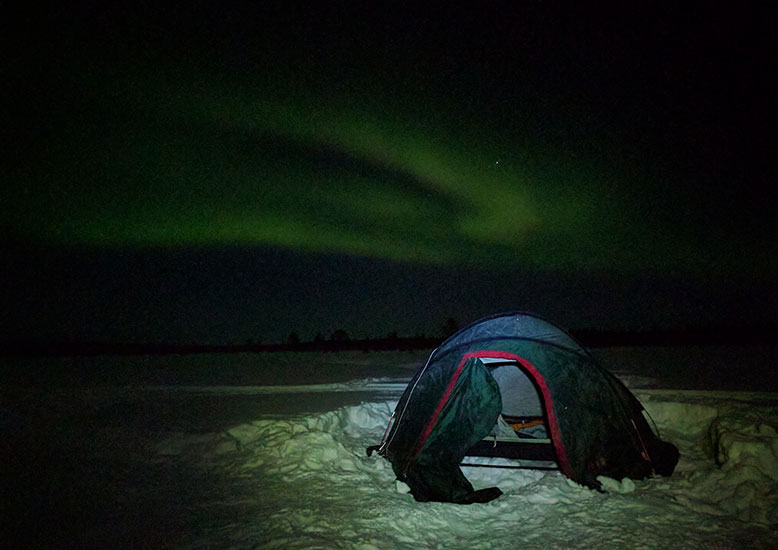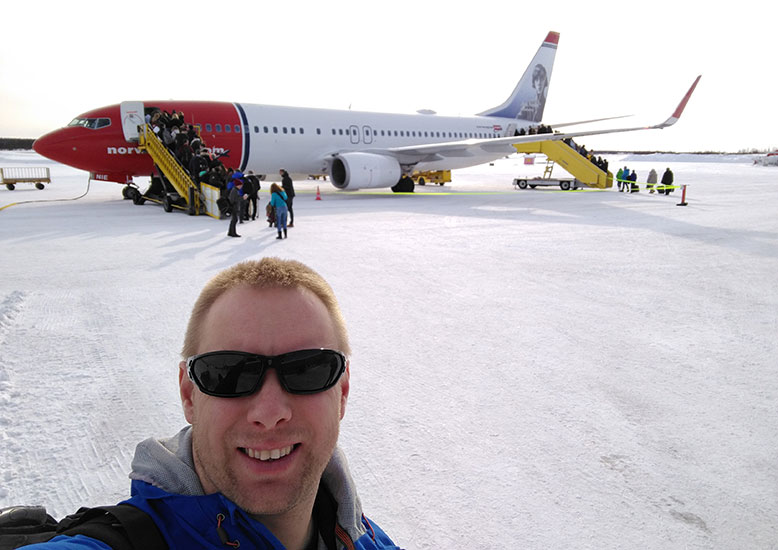- OT
- Life in practice
- Practitioner stories
- Cold comfort
My vision
Cold comfort
Travelling a marathon each day by dog sled in sub-zero temperatures is a daunting challenge for most, but, as someone living with keratoconus, Ashley Winter faced an extra hurdle. He shares his arctic adventure and positive outlook with OT

19 July 2017
Back in 2010 I found out that I needed to wear glasses. Like everyone else, it’s a bit of an inconvenience but you think, ‘Well that’s that, I’ll buy some glasses and I will be fine’ but it soon turned out it was a bit more than that.
I was having to go back every six to eight weeks to change the prescription. They examined my eyes more thoroughly and then sent me to an ophthalmologist who confirmed I had keratoconus.
Facing the fear
When I was first diagnosed, I was scared more than anything. I had never heard of keratoconus and I didn’t know what to expect. You look on the internet and you see all the horror stories, the bad stories. My biggest fear was going blind.
At the time, I was 28 years old and I hadn’t had children. All of these thoughts run through your head – ‘Am I going to see the birth of my children?’ Everything I enjoy, much like everyone else, involves using my sight. I did think that was all going to come to an end.
"I used to see my keratoconus as an unfortunate event, but now it is very much part of who I am"
Moving on
As time has gone on, I have embraced it and I have done more with my life to test myself than I ever had before. I have done half marathons, triathlons and swimming. I had the opportunity to learn to ski and ski race. I then thought, where else am I going to go? I saw this opportunity for a dog sledding expedition in the arctic. I thought I may as well give it a go.

A sight for sore eyes
Reflecting on the trip is the most rewarding thing and knowing that I have done it. I definitely learned a lot about myself there. The whole place was beautiful. I expected just a barren landscape, but being in arctic Sweden there was a lot of trees, there was a lot of wildlife and we saw reindeer. It was like a winter wonderland.
My optometrist is Gareth Hardcastle. He has his own practice, Shrewsbury Optometry. I must say he has been absolutely fantastic with me. He is so understanding and really gets what it is that I want to do. I always talk with him before I plan a trip. Obviously, when I was going to the Arctic, the temperature can be -30 and I thought I had better ask somebody about how I could manage my eye care.
Gareth sat down with me for a good couple of hours and was quite happy to email me when I had questions. He gives me good advice to questions like, ‘Are my eyeballs going to freeze?’. He is very welcoming, as are all of his team. People do their job and they get paid for it – I get that – but I do believe his team go beyond that. I don’t know where I would be without them to be honest.
In the Arctic, it was -35, we were sleeping in tents and we were travelling 50-70 kilometres a day by dog sleds. It was the biggest test and the hardest thing I have ever done in my life – being that cold, with my hands shivering, trying to put eye drops in and take lenses out to go to sleep. The contact lens solution froze and my spare contact lenses froze. At one point the tears in my eyes froze.

The future
How my sight will change is one of those things that no one seems to know. Everybody is different. It is getting worse over time but I’m not blind by any stretch of the imagination. I can still drive and I can still do everything that I want to do at the moment. Eventually I suppose I will lose my driving licence, but technology is moving so quickly who knows what is going to happen in the future.
I’m not fazed by it at all. I used to see my keratoconus as an unfortunate event, but now it is very much part of who I am. As strange as this might sound, I actually enjoy having it as part of a journey. It has made me who I am today.
Advertisement


Comments (0)
You must be logged in to join the discussion. Log in